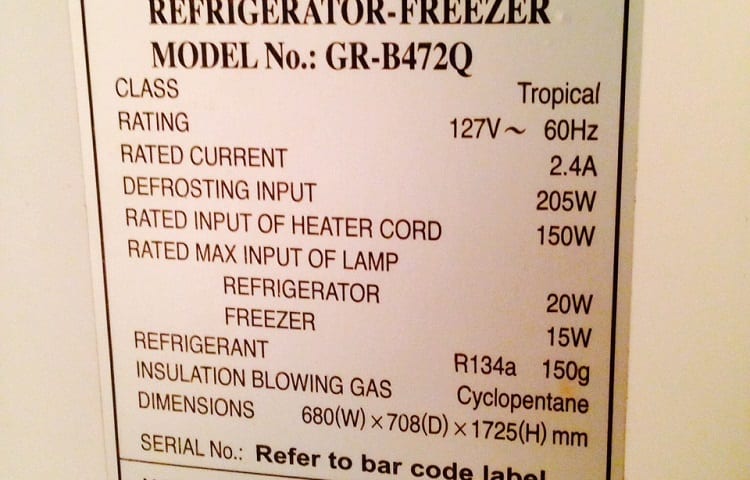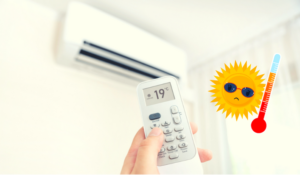When the power goes out for two or more days, the contents of your refrigerator are guaranteed to spoil. Without knowing when the power will come back on, you’re left to decide whether to keep the fridge closed to conserve cool air or start eating the food before it spoils.
Having a generator that can provide backup power to your fridge and freezer would solve your dilemma. Food is a precious commodity during any disaster. Wouldn’t it be nice to conserve food and ensure food safety by keeping the refrigerator powered with a generator?
In order to find the best type of generator to power your fridge, you need to figure out the power requirements that can run your fridge and freezer. If your plan is to mainly run the fridge, a portable generator will be a more economical choice than a standby generator. But if you wanted to run an entire house, standby generators are a better choice due to their higher power outputs.
To find the correct size of generator for your refrigerator and freezer, the two things you need to determine about your fridge are running watts and peak watts. The running watts tell you how much energy it takes to keep the fridge on. Peak watts represent the energy needed during initial startup and whenever the refrigerator kicks into cooling mode. Due to the extra power needed to run the refrigerator compressor, peak watts is about 3 to 5 times higher than running watts.
How Much Power Does a Refrigerator Use?
Different refrigerators have a wide range of power consumption depending on their energy efficiency, size, and style.
Modern refrigerators tend to be more energy efficient, requiring less powerful generators to run. For example, recent models and energy star rated refrigerators typically require 100 to 200 running watts per hour, whereas older models of a similar size may need 800 running watts. With peak watts estimated at 3 to 5 times the running watts, the energy efficiency of the refrigerator makes a huge impact on generator size and fuel usage.
While it may be obvious that size of refrigerators impact energy consumption, it turns out the style of refrigerator can also significantly impact energy efficiency.
Refrigerators with a top mount freezers are generally more energy efficient than under mount freezers or side by side ones. Mini fridges that are popular for camping only use around 50 running watts. If you have an energy hungry fridge, you might want to conserve generator fuel by switching to a mini fridge during emergencies.
Step 1: Calculate the Refrigerator’s Running Watts
The most accurate way to determine the wattage rating of your specific fridge is by reading the energy label on the back or side of the fridge. The label should specify a model number, voltage/frequency values, and rated current. The numbers you need are the voltage, expressed in volts (v), and current, expressed in amperes (A).

To get the running watts of your refrigerator, simply multiply the voltage by the current. For example if the voltage is 127v and the rated current is 2.4A, the running watts would be 304.8 watts.
Step 2: Calculate the Refrigerator’s Starting Watts (Surge Watts)
To get the starting watts of your fridge, locate a label on the compressor. There should be a number expressed in A (Amperes). It’s sometimes referred to as “Locked Rotor Amp” (LRA) or “Full Load Amperes”. It represents the higher current needed when the compressor turns on.

If the compressor label also has a voltage value, multiply that voltage by the amps. If the label doesn’t have a voltage value, use the previous voltage value you used to calculate running watts. For example, the label below doesn’t include a voltage, use the previous voltage of 127v and multiply by 6.5A to get 825.5 peak watts.
If you plan to add on other motor driven appliances, such as a sump pump, air conditioner, etc, make sure to add up all the running watts to calculate the minimal running watt requirement of your generator. To calculate the surge wattage requirement, take the largest surge watt of all your motor driven appliances and multiply that number by 1.25 to build in some buffer. Please check out our running and peak watt calculator to get the estimate.
How Many Watts of Power Does Your Generator Need to Produce
Generators are also rated based on running and peak watts. Generators can provide consistent power at its rated running watts and accommodate at surge wattage for a few seconds at a time.
Now that you know the running and peak watts of your refrigerator freezer. It’s easy to find out if a particular generator has enough capacity to power it. When you choose a generator, you have to make sure both running and peak watts of the generator are equal to or higher than the refrigerator’s running and peak watts.
If you plan to run other appliances along with the refrigerator, your generator will need to accommodate the power requirements of all the appliances you plan to run at the same time.
Not every appliance requires peak watts. Things like coffee makers, space heaters, and phone chargers draw power at a constant rate. But if you have an air conditioner, washing machine, or sump pump, you will need to know all of their peak watts to properly size your generator.
In order to size a generator for a group of appliances you want to run at the same time. You can get the total running watts by adding up the running watts of those appliances. To get the peak watts of your generator, take the highest peak watts from the list of appliances and multiply it by 1.25 to build in some buffer.
Final Thoughts
Sizing a generator is fairly straightforward. If you have a choice, it’s always better to size up a bit in case you want to power a few things at the same time. Overloading a generator can trip its circuit breaker. Older generators without modern safety features may even combust and become a fire hazard when overloaded.
Other factors to consider when looking at different types of generators are fuel type, noise level, and whether you plan to run sensitive electronics. An inverter generator might be a better choice for you than conventional generators.






